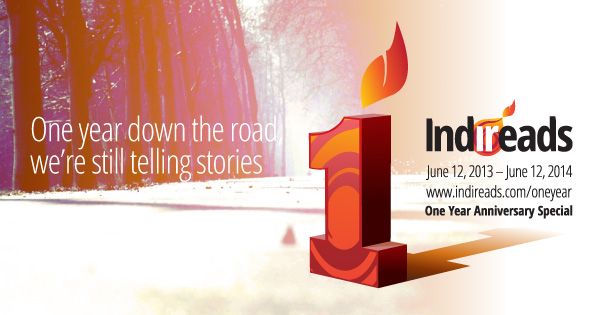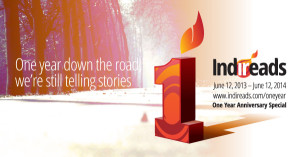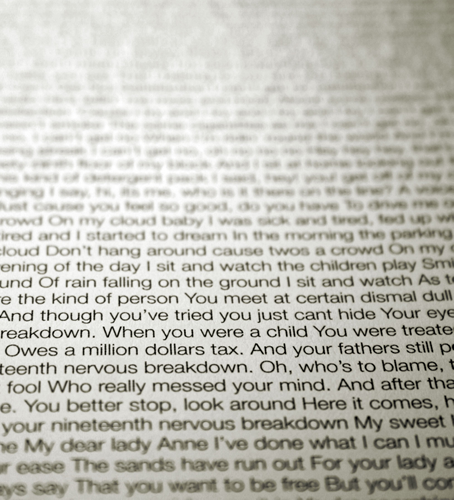Writing a novel is like running a cross-country race. You have to keep the pace, but in order to make it to the finish line, you have to make sure you don’t run out of steam too soon. Cross-country is a better analogy than a racetrack because along the way, there have to be alternate paths, diversions, scenic routes and pitfalls that need to be avoided. The finish line doesn’t need to be crystal clear, or anywhere in your line of vision when you start, and the road itself need be neither straight nor smooth.
A short story, in contrast, is a hundred yard sprint. It’s equally acceptable for the track to be crooked, but the finish line is always in sight. All that’s needed is that last burst of energy at the end that pushes the story into a glorious explosion of shock and awe.
The differences between the two forms are clear. With athletes, it’s rare to find someone with the training and adrenalin for short runs who is also a long-distance runner. One requires speed, the other requires stamina. That doesn’t mean it doesn’t happen—sprinters undoubtedly run long distances to stay fit, and triathlons and decathlons require speed and endurance to win.
There’s no precedence that says a runner can’t cross over into a different format, and when it comes to writing, there’s plenty of evidence to suggest a writer can succeed in any format he or she chooses.
Lewis Carroll wrote full-length tales that included poetry, as effortless and brilliant as his stories—his lesser-known Sylvie and Bruno is a prime example of the versatility of this man. C. S. Lewis, best known for his children’s tales, wrote several adult fantasy novels. As well-known and beloved as Asimov’s greatest novels are (Foundation, I, Robot), his short stories are extremely powerful (The Dead Past) and in some cases (Nightfall, for instance), far outweigh the value of his longer works. Just as talented, Kurt Vonnegut is known for Slaughterhouse Five and Cat’s Cradle, but also has several short stories to his name (Welcome to the Monkey House). George Orwell wrote novels (1984), novellas (Animal Farm) and short stories (Shooting an Elephant). Jane Austen is rarely known for anything other than her novels, but like other great writers, she wrote poetry, prose, short stories, even essays.
All these writers (and more, undoubtedly), were prolific, exploring all forms of writing not because they were exploring the form, but because their muse drove them in a certain direction. In some cases, they even crossed genres, because when a story needs to be told, it’s the tale, the plot, the characters, that dictate the length of the work. It’s the ideas that determine the number of words. Orwell’s allegorical Animal Farm would probably have lost much of its impact if he had forced it into a longer length.
The transition from one form to another is not a matter of skill so much as it is an understanding of how best to tell a story. If there were a set of rules for making the transition—and I’m sure there are—the first must definitely be this:
- The idea for a short story does not always work for a full-length novel. Short stories don’t necessarily include complete plots, and can be based on a moment in time, a quick glimpse that leads to something profound. So give your novel its own idea. Make it a big one.
The idea for a novel has to have (though not necessarily in a linear fashion) a beginning, a middle and an end. It should take a reader on a journey, preferably one that takes more than a few hours to read! Don’t make the mistake of thinking this is just a longer short story—it isn’t. The difference isn’t just in length, it’s the entire concept. But, because it’s a longer format, don’t approach it like a challenge. Look at this as freedom:
- Create subplots. The freedom you have in a novel is that it can be richly layered, with multiple characters, so you could conceivably create a network of short stories that work together, connected through a main character(s) and adding depth and consequence to the novel.
- Know your characters. Step inside their skins so that when you write, you’re examining several layers of personality. They’re going to be around for a long time, so make sure you love them too, just don’t make them perfect, because people never are. Or, kill them off early if you feel they can’t evolve. Because your characters, along with the plot, should evolve.
- Draw a map. Know your plots, subplots, characters and settings inside out. Use this knowledge to avoid lengthy exposition and work with dialogue and action instead. You may be a master of putting together a short story in your head, but novels are meant to be complex. Don’t make the mistake of leaving it all in the air. Put together a plan and stick to it as much as possible. Imagine that you’re putting down the sequence of events that happen in a movie you’ve seen. If you’re a planner, take the time to plan the details. If you’re not, make sure the broad strokes are in place before you start.
- Don’t worry about the word count. Short stories have boundaries, limitations that are a reassuring handicap and force a writer to establish discipline. When you start a novel, relax that discipline. If you’ve always wanted to write, then let the words flow. You can always edit it later. This leads naturally to another rule:
- Let your characters and plot dictate the next move. Sometimes, in the middle of a sentence, an idea will grab you by the throat and refuse to let go. Listen to that idea. There’s nothing wrong with letting characters write themselves, or plots unravel and destroy a plan you may have in place. Because rules, as you know, are sometimes meant to be broken.
- Once you’ve done that, however, keep track of the different threads you have flowing. At some point, either at the end or in a logical sequence, those threads need to be tied together. Unless you’re writing a series and intend to leave cliffhangers and unexplained threads that will find answers in the next book, your readers will want to know what happened.
Finally, have a little confidence in yourself. There’s no shame in taking ten drafts to write your first full-length novel. It’s not always going to write itself, but giving up is never the answer.





 I like the idea of a journal because I write it for me, meaning I am my Target Audience—this gives my imagination a lot of free rein.
I like the idea of a journal because I write it for me, meaning I am my Target Audience—this gives my imagination a lot of free rein.
 I once read a novel where a protagonist points out that the use of profanity is the sign of a stunted mind. Not only is the person swearing ill-mannered and boorish, but he (or she) obviously does not have the words in his vocabulary to effectively convey his real meaning. Hence the over-use of slang or offensive language to cover his deficiencies.
I once read a novel where a protagonist points out that the use of profanity is the sign of a stunted mind. Not only is the person swearing ill-mannered and boorish, but he (or she) obviously does not have the words in his vocabulary to effectively convey his real meaning. Hence the over-use of slang or offensive language to cover his deficiencies.
